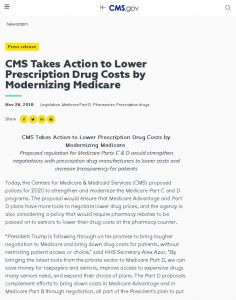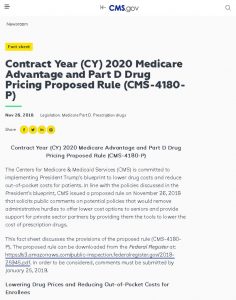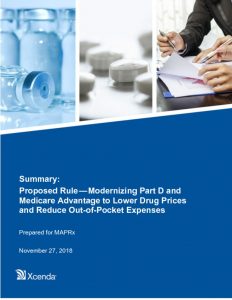
AARDA’s Statement on Medicare Part B & Part D
Administration Proposes Access Barriers to Drugs Critical to Autoimmune Patients Health
Proposed Medicare Part D Rule Allows for Step Therapy and Other Restrictions
The Centers for Medicare and Medicaid Services (CMS) recently issued a proposed rule that, if finalized, would impose dangerous new access restrictions on medicines that treat serious, complex conditions. Since the beginning of the Medicare Part D prescription drug program, CMS has recognized that therapies in six identified “classes of clinical concern” merit specific additional protections to ensure appropriate access and nondiscrimination for vulnerable patients. CMS now proposes to weaken these critically important and longstanding protections.
If implemented, the proposed changes would jeopardize efforts to ensure that Medicare beneficiaries living with autoimmune and other serious diseases receive the clinically appropriate treatment that they and their physicians understand is best for them. Under the proposal, CMS would allow Part D plans to increase their use of prior authorization and step therapy requirements—policies that often are harmful to patients by causing therapy delays and disruptions. CMS also proposes to permit Part D plans to exclude specific protected class drugs from formularies altogether in a number of circumstances.
Moreover, the proposed rule includes provisions to implement a significant and alarming policy change under which CMS would permit Medicare Advantage (MA) plans to use step therapy for Part B drugs under certain conditions. Previously, CMS has interpreted existing law to prohibit MA plans from using step therapy for Part B drugs. Under a significant change announced by CMS in August 2018 and reflected in the new proposed rule, however, beneficiaries enrolled in MA plans may face risks, starting in contract year 2019, of potential negative effects from step therapy programs for Part B drugs.
These proposed access restrictions for Part D and Part B medicines pose a threat to Medicare beneficiaries’ ability to effectively treat and manage serious and chronic health conditions. As a result, these changes, if finalized, would likely lead to poorer clinical outcomes for many Medicare beneficiaries and increased costs to the Medicare program and the healthcare system overall.
Regarding Part D’s longstanding coverage protections for the six classes of clinical concern, this policy is premised on the fact that medicines in these classes treat complex, serious, and often life-threatening conditions, and that the different therapies in these classes are not interchangeable. Accordingly, it is important for plan formularies to include “all or substantially all” drugs in these classes to ensure access to the specific treatment or combination of treatments that may work best for each patient.
Importantly, these protections have been in place since the start of the Part D program. CMS has stated, in implementing the policy, that these protections are “necessary to ensure that Medicare beneficiaries reliant upon these drugs would not be substantially discouraged from enrolling in Part D plans”—an imperative under Part D’s statutory nondiscrimination requirements. CMS’s newly issued proposals to weaken these protections would, if finalized, expose beneficiaries to access restrictions that, for many patients, would prove extremely detrimental to their health, well-being, and independence.
Access to medicines across the six protected classes is essential for individuals with serious and complex conditions, including, for example, cancer, HIV/AIDS, epilepsy, and autoimmune disorders such as rheumatoid arthritis, lupus, scleroderma, Crohn’s disease, colitis, multiple sclerosis, psoriasis, Sjögren’s syndrome, relapsing polychondritis, Behcet’s disease, myasthenia gravis, myositis, vasculitis, and others.
Individuals with autoimmune diseases face significant health challenges, often requiring lengthy evaluation and referral processes involving many specialists as well as therapeutic trial-and-error and adjustments in order to diagnose, treat, and manage their symptoms. Patients with autoimmune disorders have extremely sensitive immune systems and experience serious, chronic, and rare conditions for which there are limited treatment options. Due to the sensitivity of their immune systems, patients with autoimmune diseases experience variations in how their diseases develop, how their symptoms manifest, and how they respond to different treatments. For these reasons, access to the range of available treatment options is essential to patients’ health, functioning, and well-being.
“Senior citizens are already some of the most vulnerable patients in our health care system, and those with autoimmune diseases face even greater challenges to maintaining their health and quality of life,” said Virginia Ladd, President and Executive Director of the American Autoimmune Related Disease Association (AARDA). She added, “The last thing these beneficiaries need is the extra burden of insurance company practices like step therapy, which restricts access to necessary medicines for the sake of perceived short-term cost savings.”
Formulary exclusions, step therapy protocols, and prior authorization requirements create unnecessary and harmful hurdles to patients’ ability to access accepted standards of care. Too often, these restrictions interfere with the patient-physician relationship and can result in delayed treatment, increased disease activity, loss of function, and potentially irreversible disease progression. These restrictions also exacerbate administrative burdens for providers as they struggle to help patients navigate complicated and often opaque coverage determination processes.
Autoimmune Association has undertaken efforts to assess the use of access restrictions, such as step therapy, by health insurance plans and the resulting impact on patients. For example, AARDA’s Let MI Doctors Decide initiative, launched in 2017, recently released research results that indicate areas of significant concern for patients with autoimmune diseases under a number of Medicare plans in Michigan. The recently issued proposed changes to the Part D six protected classes policy would, if finalized, impose additional barriers to access and create more challenges for patients. Autoimmune Association is eager to work with CMS in efforts to help ensure that the Medicare program supports patients, rather than adding new barriers, and to help advance policies that secure, rather than impair, appropriate access to medicines in the six protected classes and other essential therapies that are prescribed for and relied upon by patients.



Join our email list
Receive the latest blog articles, news, and more right to your inbox!
Related articles you might be interested in

Finding Purpose on the Trail: A Father’s Journey Through the Shenandoah for His Daughter and the Autoimmune Association

Meet Erika: Battling 6 Autoimmune Diseases—and Advocating for Millions

Autoimmune Association Announces Inaugural Hope Journey Walk Inviting Communities to “Lace Up for Hope”

Art with a Mission: John von Bergen Gives Back to Autoimmune Community Through Sales
Find more resources on autoimmunity
Learn more about autoimmunity, diagnosis tips, how to find a physician, and more.